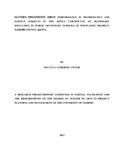| dc.contributor.author | Rautta, Catherine A | |
| dc.date.accessioned | 2013-08-12T09:43:01Z | |
| dc.date.issued | 2013 | |
| dc.identifier.citation | Rautta Catherine Awuor. 2013. Factors Influencing Girls’ Performance In Mathematics And Science Subjects In The Kenya Certificate Of Secondary Education In Public Secondary Schools In Westlands District, Nairobi County, Kenya. A Research Project report Submitted In Partial Fulfillment For The Requirements Of The Degree Of Master Of Arts In Project Planning And Management Of The University Of Nairobi. | en |
| dc.identifier.uri | http://erepository.uonbi.ac.ke:8080/xmlui/handle/123456789/55790 | |
| dc.description.abstract | The purpose of this study was to find out the factors influencing girls’ performance in science subjects in the national examination of Kenya Certificate of Secondary Education in secondary schools in Westlands District, Nairobi County. The study was guided by the following objectives; to assess girls’ performance in mathematics and science subjects in national examinations, to assess boys’ performance in mathematics and science subjects in national examinations, to examine challenges faced by girls in achieving their potential in mathematics and science subjects, to assess strategies that could be adopted in order to improve girls’ performance in mathematics and science subjects. The study employed a descriptive survey research design based on a cross sectional descriptive research and data was collected using questionnaires administered to 218 students, teachers and head-teachers of ten secondary schools in Westlands District, Nairobi County. Data was analysed using Statistical Package for Social Sciences. The findings indicated that the boys performed better in mathematics and sciences in the KCSE. However, in aggregate, the girls appeared to perform better. A total of 43.3% of the girls and 36.5% of the boys who sat for KCSE in 2011 qualified to join public university. Majority of the boys qualified for enrolment in science based courses while majority of the girls qualified for enrolment in arts based courses. The preference for science subjects was also high among the boys as compared to girls. 32.7% of the girls said that lack of interest in maths and sciences contributed to their poor performances and 42.6% said that the learning environment affected their performances. Lack of teaching apparatus contributed to poor performance among 52.5% of the girls. 30.7% of the girls said that they lack qualified teachers while 51.5% criticized on the biased instruction methods. 75.3% of the girls admitted that lack of proper preparation for examinations lead to their poor performance while incompletion of the syllabus affected the performance of 63.4% of the girls. 51.5% of the girls said that their parents were not fully concerned about their academics. Lack of vocational guidance and career counselling contributed to poor performance according to 66.6% of the female students. Parental involvement, regular assessments tests, refresher course and workshops for teachers, provision of adequate teaching resources, career counselling are effective strategies which can be used to improve the girls’ performance in mathematics and science subjects. Findings of the study will be useful to the Ministry of Education, school managers and other stakeholders. | en |
| dc.language.iso | en | en |
| dc.publisher | University of Nairobi, | en |
| dc.title | Factors influencing girls’ performance in mathematics and science subjects in the Kenya Certificate of Secondary Education in public secondary schools in Westlands District, Nairobi County, Kenya | en |
| dc.type | Thesis | en |
| local.publisher | Department of Education Administration & Planning | en |

